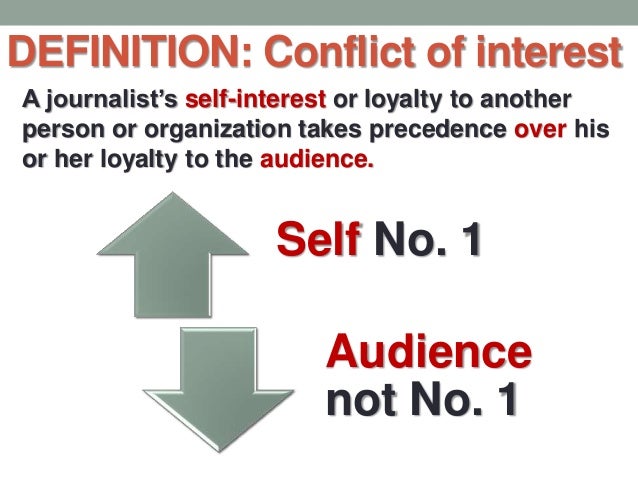im830016@ohio.edu
It is important to avoid conflicts of interest in journalism because we are supposed to set our own beliefs aside so we can discover what the truth is, Tony Rogers said. Jean Murray said that a conflict of interest is a situation when a person has an issue with interests or loyalties competing. One example of a conflict of interest was in one of the readings we read for class. There was a reporter named Anna Song who was covering a memorial service for some girls who were kidnapped and murdered. Song spoke about the girls publicly during the memorial, and she said good things about them. There is an issue with what she did because she was supposed to be watching the event as a reporter and not someone who has a bias. It is a conflict of interest when you have a bias toward something because it could affect the way you write about it. We are only supposed to report facts.
Accepting favors or gifts from sources is another form of conflict of interest. Some examples would be if a source offered to give you some information in exchange for something else or if they offered to give you a gift or a trip. We as journalists are supposed to act independently. Doing things such as putting certain signs in your yard, donating to certain political groups and publicly endorsing candidates are also conflicts of interest. We are obligated to report about politics without bias and allowing our personal beliefs to get in the way could affect the way we write and report things. Publicly showing our political beliefs could also lead people to believe that we are biased reporters.
Avoiding conflicts of interest is an important thing in public relations, too. PR practitioners need to be transparent with their clients and disclose things that could be potential conflicts of interest. The PRSA Code of Ethics says that its members should act in the best interests of their clients or employers, avoid things that could make a conflict between professional interests and disclose things that could be a potential conflict of interest. I think that following the principles set up by the PRSA will help PR practitioners to make ethical decisions.
I think that news organizations and PR firms should always make it a priority to avoid conflicts of interest so people don't lose faith in them and/or accuse them of being biased. Conflicts that cannot be avoided need to be disclosed. Disclosure is an important thing to consider when it comes to being transparent. Our recent case study assignment in class presented some ethical challenges that involved conflicts of interest. An issue I had to consider was if my news organization in the scenario had a bias toward a certain person because of a past encounter with them and whether or not we should report about some charges they were found innocent of. There was also an issue with disclosure in this case. I made the decision to disclose that we made an agreement with an organization and also had a meeting with a district attorney. I chose to disclose these things so we could be transparent and not show any bias.

No comments:
Post a Comment